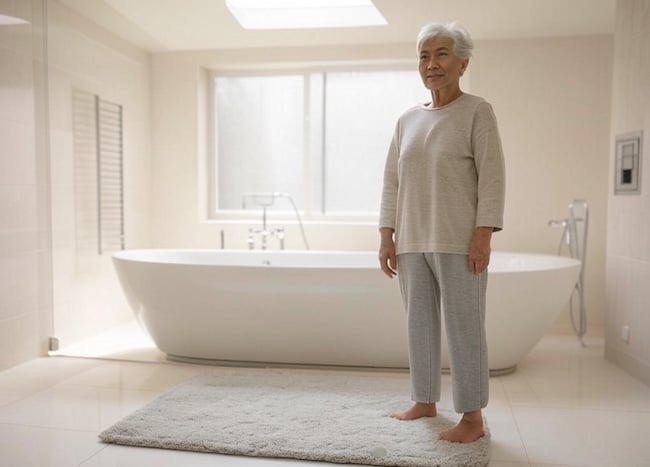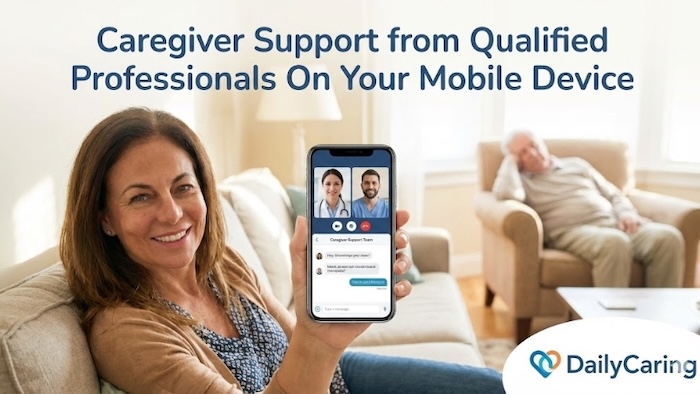Caring for an older adult can be both rewarding and challenging. As the demands of caregiving increase, the right technologies can provide invaluable support.
From ensuring safety and health to providing comfort and companionship, the right technology can significantly improve seniors' quality of life and give you added peace of mind, reduced stress, and a lighter workload.

10 Helpful Tech Products for Seniors
Here, we explore 10 top senior care technologies that are revolutionizing how family caregivers manage their responsibilities and ensure the safety, comfort, and well-being of their loved ones.
1. Medical alert systems
Medical alert systems have long been used in senior care. These devices are typically wearable pendants or bracelets with an emergency button that the wearer can press to call for help.
Advanced models now include features like automatic fall detection, GPS tracking, and health monitoring.
Immediate access to emergency services and fall detection that automatically alerts them without the wearer pressing any buttons gives caregivers peace of mind.
2. Telehealth services
Telehealth services allow older adults to consult with healthcare professionals from the comfort of their homes using video calls.
Telehealth reduces the need for transportation to appointments, offers convenient access to medical advice and consultations, and is ideal for regular check-ins and managing chronic conditions.
3. Communication platforms
Staying connected with family and friends is essential for seniors’ emotional well-being.
Communication platforms such as video-calling apps, social media, and specialized senior-friendly devices keep loved ones in touch.
These platforms help reduce feelings of isolation and loneliness, have easy-to-use interfaces, and make it easy to communicate regularly with family and friends.
4. Smart home devices
Smart home technology can significantly enhance older adults’ safety and comfort.
Devices like smart lights, smart thermostats, and voice-activated assistants can be controlled remotely. This allows families to monitor and adjust settings from anywhere.
Additional benefits of smart home devices include: increased safety with features such as automated lighting to prevent falls, comfort and convenience with voice commands to control devices, and remote monitoring and control for caregivers.
VIDEO: 10 Cool Tech Products for Older Adults
5. Medication management systems
Proper medication management is crucial for seniors with multiple prescriptions.
Automated pill dispensers and medication reminder apps help make sure that seniors take their medications as prescribed.
They simplify the management of multiple medications, reduce the risk of missed or incorrect dosages, and some devices can also alert caregivers if a dose is missed.
6. GPS tracking devices
For seniors with Alzheimer’s disease or another dementia, the risk of wandering can be a serious concern.
GPS tracking devices, which can be worn as a watch or attached to clothing, provide real-time location tracking.
These devices provide real-time location updates, send alerts if the senior leaves a designated safe area to prevent wandering, and give caregivers peace of mind, knowing they can quickly locate their loved one if they get lost.
7. Wearable health devices
Wearable health devices, such as smartwatches and fitness trackers, can monitor vital signs, including heart rate, blood pressure, and sleep patterns.
This data can be shared with healthcare providers to improve the management of the senior's health.
Wearable health devices offer the advantage of continuous health monitoring, data sharing with healthcare providers for informed care decisions, and encouragement of physical activity and healthy habits.
8. Remote monitoring systems
Remote monitoring systems use sensors and cameras to track seniors' daily activities.
These systems can alert caregivers to unusual activity or a lack of movement, which could indicate a problem.
Key benefits of remote monitoring systems include non-intrusive monitoring of daily activities, alerts for potential issues such as falls or inactivity, and a detailed activity log for family caregivers.
9. Virtual Reality (VR) and Augmented Reality (AR)
Virtual and augmented reality technologies are emerging tools in senior care.
VR can provide immersive experiences that help with cognitive stimulation and relaxation, while AR can assist with visual and spatial tasks.
Engaging VR experiences offer cognitive stimulation and therapeutic benefits like reducing anxiety and depression. AR technology can assist with navigation and other practical tasks.
10. Robotic assistants
Robotic assistants are becoming more sophisticated and can now perform a range of tasks, from reminding seniors to take their medications to providing companionship.
These assistants can help with daily tasks, reminders, companionship, and interaction for people living alone. Advanced models can even monitor health and safety.
Final Thoughts
Embracing these tools isn't about complicating life with more gadgets, it's about simplifying it. The right technology can be a powerful ally, reducing daily stress, strengthening connections with family and friends, and ultimately fostering a greater sense of independence and safety for your loved one.
You don't have to adopt everything at once. Start with one product that solves your most pressing challenge. A small technological step can lead to a giant leap in peace of mind for everyone involved.
Recommended for you:
- How Amazon Echo Alexa Helps Seniors with Dementia
- Best Way to Make Video Calls to Seniors with Alzheimer’s or Dementia in Nursing Homes
- 5 Worst Tech Gifts for Seniors (and What to Give Instead)
About the Author

Lance A. Slatton CSCM – Known as “The Senior Care Influencer” is a Writer, Author, Influencer, and Healthcare professional with over 20 years in the healthcare industry. He is a senior case manager at Enriched Life Home Care Services in Livonia, MI. Lance A. Slatton is also the host of the award-winning podcast & YouTube channel All Home Care Matters.














Would like names of medical alerts to look into. I prefer wrist vs neck. The best and worst, please.
Thank you
We found a great article that reviews top medical alert products at the National Council on Aging at https://www.ncoa.org/adviser/medical-alert-systems/best-medical-alert-systems/